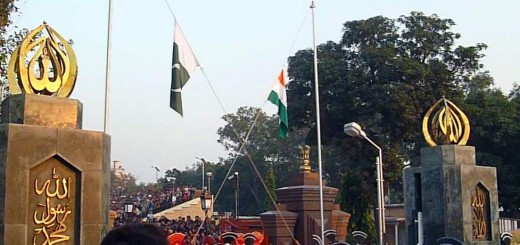A Nation of Beggars – By Murad Ali Baig
Perhaps someday India will find a leader who has the courage to proclaim “Ameeri badao” instead of “gareebi hatao” and let loose India’s gigantic potential.
One is filled by a feeling of despair on returning to India after every visit to countries in South East Asia. The stench of unsanitary loos, the rattle of wobbly trolleys, the sight of peeling panels and the babble of shrieking voices assail the senses. Nothing improves much because there are insufficient budgets and too much work cannot be expected from the poor workers.
India’s freedom fighters, socialist ideologues and the Swadeshi bunch have conspired to make everyone believe in India’s poverty. Poverty has become India’s greatest national asset and millions are sustained by long chains of beggars bowls stretching from villages to blocks to districts to the state capitals to the centre from where the nation begs for aid from richer countries, World Bank and IMF.
So deep has been the conditioning that no Indian is ashamed to beg and has become absolutely oblivious of the fact that the rest of the world sees our country as a nation of dirty, noisy, corrupt, chaotic beggars that is incapable of real improvement. Not a nation to visit or to invest in.
Centuries of foreign domination had made people hide their wealth from extortionist rulers and their tax collectors so a virtue was made of simplicity and thrift while affluence, style and modern living was frowned upon. Over the past century, India’s poverty has become such an article of faith as to be a virtual orthodoxy. It is almost sacrilegious for anyone to suggest that India is poor no more.
Researchers at the National Sample Surveys or other research agencies will tremble at suggesting that the country is becoming richer even when faced with irrefutable data that the poor are consuming much more. This perhaps explains why on the same NSS data, researchers from Princeton University have concluded that India’s rural poverty had declined from 38.3% in 1987-8 to 32.9 in1993-4 while Government officials concluded a miniscule decline from 39.3 to 37.2 for the same period. As with all orthodoxies, inconvenient facts will be dismissed as aberrations and the faith in a poor India will be staunchly proclaimed.
While no one can deny the existence of poverty in India, it is most visible in our cities where organised beggary thrives and makes an exaggerated parody of penury. Very few people actually die of hunger in our villages except in times of floods and drought. Examples of serious deprivation are undoubtedly evident but are mostly among the aged, sick and infirm of whom India has very many millions.
They are, however, a social and not an economic problem. Few of India’s young and able-bodied starve. If they did there would be no shortage of servants, carpenters, masons or plumbers. Infact, many rural youth, with half-baked and half-finished educations in demoralising Government schools are often unwilling to work on their family farms. Millions shift from the boredom of villages to the enticing attraction of cities as portrayed in popular films, where they aimlessly seek what jobs they can. They are the tragic victims of bad education and wrong values. The State has made them unfit for both our towns and villages.
Politicians have a vested interest in India’s poverty because it is the staple of all political parties who try to outdo each other to clamber to power with claims of being the benefactors of the poor. The poor are not the big vote banks that they are believed to be but programmes aimed to enrich them end up enriching rural Kulaks and urban slumlords who can muster votes for their political benefactors. The poor do not inherit the earth but poverty programmes enriches venal politicians and their equally avaricious bureaucrats who are the instruments to achieve their ends. It is little surprise, therefore, when more than half the funds allotted for poverty alleviation finds it’s way into their grasping hands.
The irony is that the poverty myth has itself become a barrier to reducing poverty. The huge investments into the Public Sector, roads, power, irrigation, roads and other infrastructural projects are sources of gigantic gratifications. With a cavalier disregard for those who can benefit from such resources, the politicians and officials are so ruthlessly committed to looting the system that projects are callously prolonged for as long as possible until these sacred cows yield blood instead of milk. Despite lip service to reform and privitisation, they are firmly united in preserving a rotten system.
This poverty paradox impacts on people even more directly. Slums cannot be cleared, roads widened, unsanitary eateries shifted or beggars rehabilitated because these will be seen as anti poor actions despite the fact that most slum dwellers, dhaba owners and beggars are not poor. Similarly, there is a great reluctance to charge fair rates for electricity, diesel, fertilisers or water even though the subsidies mainly enrich the already rich. Thus infrastructure development languishes pulling back the technological, economic and employment growth that alone can reduce poverty.
Trade unions, long the playground of budding politicians, have had similar soft treatment with the result that organised workers in industry or public services only pretend to work. And unless they can be made to work, India will always remain poor. Privitisation is not the only answer. The Central, State and local Governments are too huge to be quickly done away with. It has to be reformed even in the face of protracted strikes. Laws need to be simplified and updated while obsolete ones removed. Most of all Government servants need to be made accountable for failure and achievement instead of being slaves of procedure.
Progress demands that there must be rewards for good work and punishment for the lazy, obstructive, violent or dishonest in every sector. Indian’s have thrived in foreign countries where the work ethic has rewards for honesty and hard work and instant dismissal for failure or dishonesty. In our sacred land, by contrast, hard work and honesty attract criticism and career damage while there are rewards for the lazy and dishonest.
Till 800 years ago, India was the richest country in the world and known to the Western world as the land of gold. Very little of this gold was mined here but huge quantities were imported in exchange for the produce of industrious and hard working peasants and artisans. Then a new Brahminical order deemed manual work to be ‘arth’ and unfit for the higher classes. People were then divided into classes who gave orders and classes who had to carry them out. The former became arrogant and feudal while the workers lacking leadership and example, became slip-shod, slovenly and callous. This marked the moment when the creativity and vitality of India died leaving it vulnerable to more aggressive and harder working foreign people.
When politicians will not act and when bureaucrats are unwilling to oppose their self-serving actions, the courts have had to intervene. The speed with which some recent court decisions concerning pollution, encroachments or slums has triggered change gives reason for great hope. It took China just four years to move from the sluggish years under Mao to become a super power. It took the Philippines just one year to overcome a gigantic power crisis at the end of Aquino’s populist rule. Thailand built a supurb 31-km skytrain through congested Bangkok in less than three years. A few decades ago we looked down on Korea, Malaysia, Thailand, Philippines and other developing countries. Today India is not even regarded as part of a resurgent Asia.
India is pathetically proud of the achievements of its young software and Internet whizkids. Fortunately the Government and politicians did no understand the new frontiers they were exploring so they thrived in an environment where they faced no restrictions or regulations. They cut through global competition like knives through butter and became respected global citizens willing to work hard and sincerely without counting the hours.
India is a rich land with far greater physical and human resources than any neighbour. Its poverty stems entirely from having forgotten how to work and being ashamed of displaying all manifestations of wealth. Perhaps someday India will find a leader who has the courage to proclaim “Ameeri badao” instead of “gareebi hatao” and let loose India’s gigantic potential.
With special thanks to M.A. Baig for the contribution












